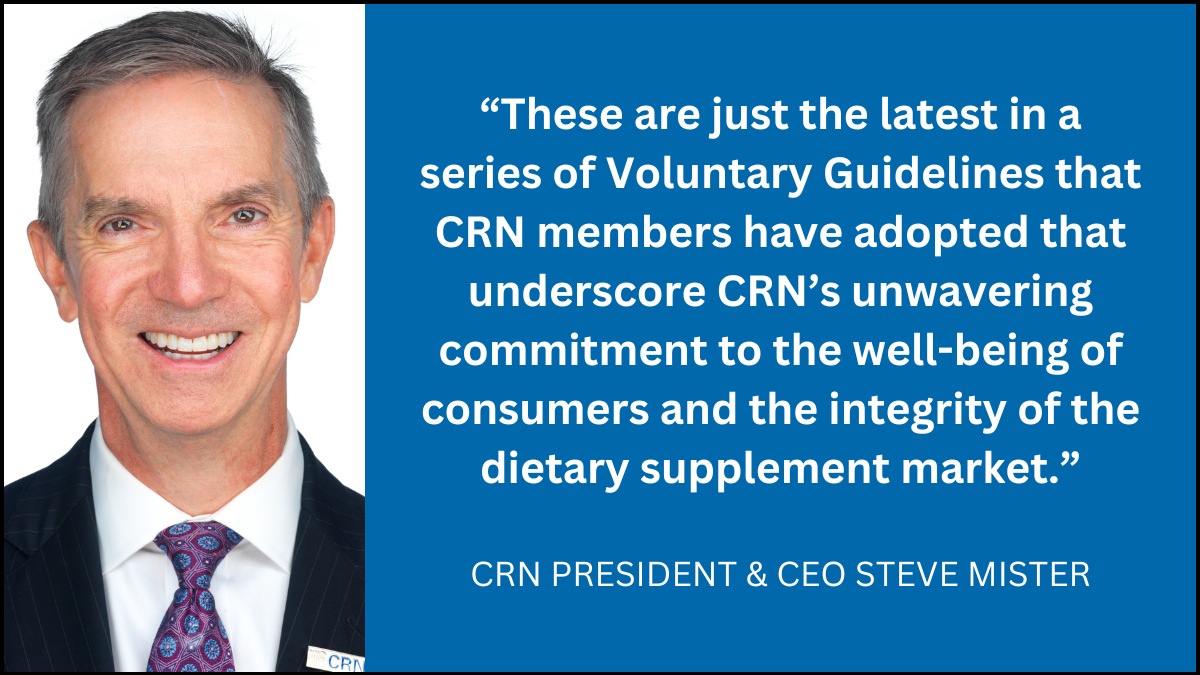APRIL 15, 2024
New labeling guidelines also released for all gummy supplements
WASHINGTON — The Council for Responsible Nutrition (CRN), the leading trade association for the dietary supplement and functional food industry, proudly announces the adoption of two sets of new voluntary guidelines: one focused on the formulation, labeling, and packaging of melatonin-containing dietary supplements marketed for sleep support, and another dedicated to the labeling of gummy dietary supplements. Adopted by CRN’s Board of Directors on March 28, 2024, these guidelines are a testament to CRN’s members’ commitment to establishing responsible marketing practices for the industry and ensuring the highest standards for consumer products.
The updated melatonin guidelines provide recommendations addressing intentional overages during manufacturing, child-deterrent packaging, and precautionary label statements for melatonin-containing products. These guidelines are designed to ensure that consumers have access to products that are responsibly formulated, labeled and packaged.
With the growing popularity of gummy dietary supplements among consumers of all ages, CRN’s new guidelines for gummy supplements specifically address the unique aspects of these products. The new recommendations focus on labeling clarity, reducing unsupervised access by children, addressing potential choking hazards for small children, and ensuring products are used as intended.
Key Updated Recommendations for Melatonin Supplements:
- Labeling Instructions: The revised melatonin guidelines call for cautionary label statements alerting consumers that melatonin may cause drowsiness, not to take with alcohol, and that the products are intended for intermittent or occasional use only.
- Overages During Manufacturing: While recognizing that federal regulations require dietary supplement to contain at least 100 percent of their labeled amounts throughout shelf life, the guidelines recommend that any overages of melatonin added during manufacturing be informed by data to support stability and safety.
- Child deterrent packaging: While federal regulations do not require child deterrent closures for melatonin-containing products, CRN’s revised guidelines call for industry members to adopt child deterrent packaging for products containing melatonin that are in flavored chewable forms that could be especially attractive to children. This recommendation provides parents and caregivers with a tool to prevent unsupervised access to these products.
- CRN members are being asked to adopt these guidelines for melatonin-containing supplements within 18 months.
Key Recommendations for Gummy Form Supplements:
- Targeted Advisories: Detailed labeling advisories for products aimed at both adults and children include specific considerations for gummy supplements intended for young children and underscore the importance of using these products under appropriate conditions and guidance.
- Avoiding Potential Choking Hazards: For products intended for children under 4 years of age, the guidelines recommend a precautionary statement that if not chewed properly, the product could present a potential choking hazard.
- Packaging Considerations: The recommendations ask manufacturers to consider packaging gummy products in containers with child deterrent closures (e.g., by evaluating various product attributes like ingredient profiles, serving amounts, and total package contents, when making their packaging choices).
- CRN members are being asked to adopt these guidelines for gummy supplements within 24 months.
“These are just the latest in a series of Voluntary Guidelines that CRN members have adopted that underscore CRN’s unwavering commitment to the well-being of consumers and the integrity of the dietary supplement market,” said CRN President and CEO, Steve Mister. “By setting these high standards, we help our members offer products that are responsibly manufactured and marketed, and widely trusted by consumers.”
CRN urges its members and the broader industry to adopt these guidelines as soon as practicable, with specific implementation timelines provided for each set of guidelines to facilitate a smooth transition.
CRN has developed a collection of self-regulatory practices aimed at enhancing the safety, clarity, and efficacy of dietary supplements and functional foods across various categories. These include specific guidelines for caffeine-containing supplements, enzyme dietary products, and the provision of product information for e-commerce purchases. There are also guidelines to ensure the right iodine levels in supplements for pregnant and lactating women, as well as on the formulation, labeling, and packaging of probiotics. Other voluntary programs address the complex area of supplements containing proprietary blends, protein labeling, and a prohibition on SARMs-containing supplements. CRN members are also required to participate in the Supplement OWL, the industry’s voluntary label registry managed by CRN. This comprehensive framework is designed to uphold the highest standards of consumer safety and product transparency in the industry.
To view a complete list of CRN’s Voluntary Guidelines and Best Practices, visit: https://crnusa.org/self-regulation/voluntary-guidelines-best-practices

The Council for Responsible Nutrition (CRN), founded in 1973, is a Washington, D.C.-based trade association representing 180+ dietary supplement and functional food manufacturers, ingredient suppliers, and companies providing services to those manufacturers and suppliers. In addition to complying with a host of federal and state regulations governing dietary supplements and food in the areas of manufacturing, marketing, quality control and safety, our manufacturer and supplier members also agree to adhere to additional voluntary guidelines as well as to CRN’s Code of Ethics. Follow us on Twitter @CRN_Supplements and LinkedIn.

